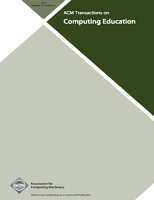
ACM Transactions on Computing Education
Scope & Guideline
Shaping the Future of Computing through Academic Excellence.
Introduction
Aims and Scopes
- Equity and Inclusion in Computing Education:
One of the core areas of focus is on promoting equity and inclusion in computing education, particularly for underrepresented groups such as women and racial minorities. This includes examining the intersectional experiences of diverse student populations and developing strategies to enhance their participation and success. - Innovative Pedagogical Practices:
The journal emphasizes the exploration of innovative teaching methodologies, including collaborative learning, gamification, and contextualized learning experiences that engage students and enhance their understanding of computing concepts. - Curriculum Development and Assessment:
Research on curriculum design, assessment strategies, and the integration of computational thinking across educational levels is a significant focus, ensuring that curricula remain relevant and effective in preparing students for future challenges. - Technology-Enhanced Learning:
The use of technology in education, including online learning environments, adaptive assessment, and tools for programming education, is a prominent theme. This involves evaluating the efficacy of various technological interventions and their impact on student learning outcomes. - Professional Development for Educators:
The journal also addresses the professional growth of educators in computing through systematic reviews and empirical studies, focusing on their competencies, attitudes, and the resources necessary for effective teaching.
Trending and Emerging
- Intersectionality in Computing Education:
There is a growing emphasis on understanding how intersectionality affects students' experiences and identities in computing education. This includes a focus on the experiences of Black girls and women, which highlights the need for tailored interventions and support. - Ethics in Computing Education:
The integration of ethics into computing curricula is gaining traction, with research exploring how ethical considerations can be effectively taught and assessed within technical courses, ensuring that future professionals are equipped to deal with real-world dilemmas. - Community and Collaboration in Learning:
Emerging themes include the role of community and collaboration in learning environments, particularly through peer mentoring and collaborative projects, which are seen as vital for enhancing student engagement and success. - Technology-Driven Pedagogical Innovations:
Innovative uses of technology, such as AI and gamified learning experiences, are becoming increasingly prevalent in research, reflecting a trend towards integrating cutting-edge tools to enhance student learning and motivation. - Focus on Professional Skills and Career Readiness:
There is an increasing trend towards research that examines how computing education can better prepare students for the workforce, including studies on employability skills, internships, and the role of social capital in career advancement.
Declining or Waning
- Traditional Programming Languages and Methods:
Research focusing primarily on traditional programming languages and methods is becoming less frequent, as the field shifts towards more contemporary approaches that incorporate diverse programming paradigms and tools. - Generalized Studies on Gender Differences:
While gender-related research remains important, studies that simply report on generalized gender differences in computing attitudes without deeper analysis or actionable insights are declining, indicating a move towards more nuanced and intersectional approaches. - Basic Computational Thinking Concepts:
There appears to be a waning interest in basic computational thinking concepts without context or application, as researchers increasingly focus on applied and contextualized approaches to teaching these skills. - Standardized Testing in Computing Education:
The focus on standardized assessments and their impact on computing education outcomes seems to be lessening, as educators and researchers explore more holistic and formative assessment strategies. - Studies on Student Attitudes without Intersectional Analysis:
Research that solely examines student attitudes towards computing education without incorporating intersectional frameworks or diverse perspectives is becoming less prevalent, signaling a shift towards more inclusive research methodologies.
Similar Journals

Journal of Mathematics Teacher Education
Exploring New Frontiers in Mathematics InstructionJournal of Mathematics Teacher Education, published by SPRINGER, serves as a pivotal platform for scholarly communication in the fields of Education and Mathematics. With a distinguished Q1 ranking in both disciplines and exceptional Scopus rankings—placing it in the top 94th percentile for Mathematics and the 84th percentile for Education—the journal is dedicated to advancing research and practice in mathematics education from a global perspective. Established in 2005 and converging towards 2024, it invites contributions that investigate innovative teaching strategies, curriculum development, and teacher education methodologies. Although the journal does not offer Open Access, its rich collection of empirical studies, reviews, and theoretical articles provides invaluable resources for educators, researchers, and students aiming to elevate the quality of mathematics instruction. Situated in Dordrecht, Netherlands, the Journal of Mathematics Teacher Education remains a significant asset to the academic community, fostering discussions that drive progress and enhance student learning experiences.

Informatics in Education
Empowering Education Through Informatics InnovationInformatics in Education is a premier academic journal published by Vilnius University, Institute of Mathematics and Informatics, focusing on the intersection of information technology and pedagogical innovation. With an ISSN of 1648-5831 and an E-ISSN of 2335-8971, this Open Access journal has been disseminating critical research since 2003, enabling widespread accessibility and collaboration across the global educational community. The journal's commitment to advancing the field is demonstrated by its impressive 2023 Category Quartiles: Q1 in Communication and Education and Q2 in Computer Science Applications, highlighting its significant impact on these disciplines. Located in Lithuania, Informatics in Education ranks impressively in Scopus, with a Social Sciences Communication rank of #54/511 (89th percentile) and a Social Sciences Education rank of #188/1543 (87th percentile). The journal's goals include fostering research that informs pedagogical practices and enhances educational outcomes through the innovative use of technology, ensuring it remains at the forefront of research in this vital field. Researchers, professionals, and students alike will find a wealth of knowledge within its pages to support their work and learning endeavors.

Revista EDaPECI-Educacao a Distancia e Praticas Educativas Comunicacionais e Interculturais
Fostering Global Collaboration in Educational PracticesRevista EDaPECI-Educacao a Distancia e Praticas Educativas Comunicacionais e Interculturais, published by the Universidade Federal de Sergipe, is a distinguished open-access journal focusing on innovative practices in distance education and intercultural communication within educational contexts. Since its inception in 2009, this journal has aimed to provide a platform for researchers, educators, and practitioners to share insightful studies and methodologies that enhance teaching and learning processes in diverse educational settings. With an ISSN of 2176-171X, it contributes to the growing discourse on the integration of technology in education and aims to bridge gaps in intercultural understanding. The journal's commitment to open access ensures that knowledge is accessible to all, fostering collaboration and advancement in educational practices globally. As the field of distance education continues to evolve, Revista EDaPECI stands out as an essential resource for those seeking to explore and contribute to this dynamic and impactful area of study.

Journal of Advanced Academics
Shaping the Future of Advanced Academic PracticesThe Journal of Advanced Academics, published by SAGE Publications Inc., is a leading peer-reviewed journal dedicated to the exploration and dissemination of research addressing the multifaceted dimensions of advanced academic practices and gifted education. With an ISSN of 1932-202X and E-ISSN 2162-9536, the journal has steadily gained recognition since its inception in 2006, currently holding a commendable Q2 ranking in the Education category, indicating its significant contribution to the field. The journal boasts a Scopus rank of #335 out of 1543 in Social Sciences - Education, placing it in the 78th percentile and underscoring its influence among researchers and practitioners alike. The Journal of Advanced Academics seeks to foster an understanding of innovative instructional strategies, cognitive development, and policy implications in gifted education, making it an essential resource for educators, researchers, and policymakers aspiring to elevate the quality of educational experiences for advanced learners. For those looking to stay abreast of cutting-edge research in this domain, the journal’s timely articles and reviews encompass critical discussions that inform and inspire progressive educational practices.

JOURNAL FOR RESEARCH IN MATHEMATICS EDUCATION
Advancing the frontiers of mathematics education research.The JOURNAL FOR RESEARCH IN MATHEMATICS EDUCATION, published by the NATIONAL COUNCIL OF TEACHERS OF MATHEMATICS (NCTM), stands as a premier platform for scholarly discourse in the realm of mathematics education. With an impactful position bolstered by Q1 rankings in both Education and Miscellaneous Mathematics for 2023, this journal has gained notable recognition, ranking 6th out of 90 in the mathematics category and 261st out of 1543 in social sciences education on Scopus. Spanning research outputs from 1996 to 2024, it serves as an invaluable resource for educators, researchers, and students alike, fostering an understanding of innovative teaching methodologies, pedagogical advancements, and mathematical cognition. Though not openly accessible, its rich content is crucial for anyone invested in enhancing mathematics education and supporting the development of effective teaching practices. To explore significant findings and trends in mathematics education, this journal is indispensable for academic professionals aiming to elevate their research and educational strategies.
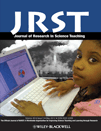
JOURNAL OF RESEARCH IN SCIENCE TEACHING
Shaping Tomorrow's Science Classrooms TodayJOURNAL OF RESEARCH IN SCIENCE TEACHING, published by WILEY, is at the forefront of educational research, specifically focusing on the dynamic field of science education. With an impressive Q1 ranking in the education category for 2023 and a percentile of 95th among its peers in Scopus, this journal serves as a critical resource for researchers, educators, and policymakers dedicated to improving teaching and learning practices in science. Established in 1963 and consistently published through 2024, the journal caters to a diverse audience by disseminating rigorous, peer-reviewed research that informs instructional strategies, curriculum development, and assessment techniques. Although it does not currently offer open access, the journal remains a prestigious platform for impactful scholarship in science education, located in Hoboken, NJ. Researchers and professionals alike will find here not only valuable insights but also innovative approaches that are essential to advancing science education in the 21st century.
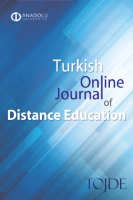
Turkish Online Journal of Distance Education
Exploring New Frontiers in Distance Learning.Turkish Online Journal of Distance Education, a distinguished publication from ANADOLU UNIVERSITY, serves as a vital resource in the field of distance education, contributing significantly to the ongoing discourse since its inception in 2000. With an impressive impact factor that reflects its standing within the academic community, this open access journal provides an influential platform for researchers, educators, and practitioners to disseminate innovative findings and educational strategies. Ranked in the Q2 category within the education sector according to the 2023 quartile rankings, and boasting a commendable position of #423 out of 1543 in Scopus' Social Sciences Education rankings, the journal places itself firmly within the 72nd percentile of its cohort. Spanning from 2004 to 2024, the journal's commitment to advancing scholarship in distance education is reflected not only in its comprehensive articles but also in its responsive engagement with contemporary educational challenges. Positioned in Eskişehir, Turkey, this journal aims to elevate discussions surrounding online learning and contributes to the global dialogue on education accessibility and innovation.
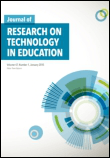
Journal of Research on Technology in Education
Shaping the Future of Education with Groundbreaking Technology Insights.The Journal of Research on Technology in Education is a premier academic publication dedicated to exploring the intersection of technology and education. Published by ROUTLEDGE JOURNALS, TAYLOR & FRANCIS LTD, this journal stands at the forefront of educational research, boasting impressive Q1 rankings in both Computer Science Applications and Education for 2023. With an ISSN of 1539-1523 and an E-ISSN of 1945-0818, it is recognized in the Scopus database, ranking 31st out of 1543 in the field of Education, placing it in the 98th percentile, and 73rd out of 817 in the domain of Computer Science Applications, within the 91st percentile. The journal is committed to publishing high-quality research that informs practice and policy, with a scope that covers innovative uses of technology in educational settings from its inception in 2001 through 2024 and beyond. It is an essential resource for researchers, educators, and policymakers looking to harness the potential of technology in enhancing teaching and learning experiences.
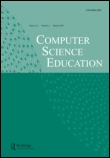
Computer Science Education
Advancing the Frontier of Computer Science LearningComputer Science Education is a prestigious journal published by ROUTLEDGE JOURNALS, TAYLOR & FRANCIS LTD, focusing on the critical intersection of computer science and educational practices. Established in 1988, this journal has become a cornerstone for researchers, educators, and practitioners interested in enhancing teaching methodologies and learning outcomes in computer science. With an impressive ranking within the top quartile (Q1) in both Computer Science (miscellaneous) and Education categories for 2023, as well as high Scopus percentile placements, it underscores its significance in advancing the discipline. The journal offers a platform for innovative research encompassing diverse educational environments and approaches, and while it currently does not offer open access options, it remains committed to disseminating high-quality scholarly work. As a vital resource for anyone looking to contribute to and understand the evolving landscape of computer science education, Computer Science Education continues to shape the future of learning in this dynamic field.

Profesorado-Revista de Curriculum y Formacion de Profesorado
Fostering Scholarly Communication in EducationProfesorado-Revista de Curriculum y Formacion de Profesorado is a prominent academic journal dedicated to advancing the fields of curriculum studies and teacher education. Published by the esteemed Universidad de Granada's Grupo Investigación FORCE, this Open Access journal has been fostering scholarly communication since 1998, ensuring that research is easily accessible to a global audience. With an ISSN of 1138-414X and an E-ISSN of 1989-6395, it is a respected voice in the education community, currently rated Q3 in Education for 2023, showcasing its relevance and contribution to the discipline. The journal encompasses a wide range of topics related to pedagogy, curriculum development, and teacher professional development, aiming to provide innovative insights and promote best practices among educators. Its Scopus ranking reflects its standing in the field, placing it at #793 out of 1543 in the Social Sciences - Education category, in the 48th percentile, indicating a competitive niche within academic research. Based in Granada, Spain, this journal plays a crucial role in bridging educational theory and practice, making it an essential resource for researchers, practitioners, and students committed to enhancing educational experiences.